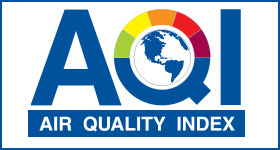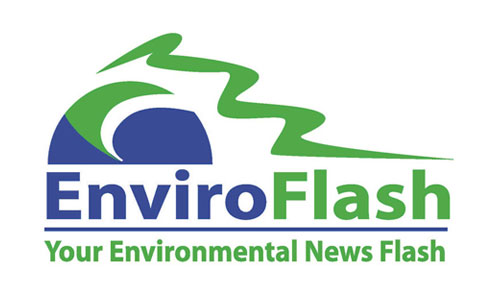Air Quality Awareness Week
May 5 – May 9, 2025
Monday, May 5: Air Quality and Your Health
The air quality in New Jersey has improved significantly over time and New Jersey measures compliance with most of the National Ambient Air Quality Standards. Yet there are still days when certain pollutants in the air can be elevated to levels that may affect public health. Ground-level ozone and particulate matter are air pollutants known to cause health effects like chest pain, coughing, throat irritation, or worsen asthma and heart disease. Staying informed about daily outdoor air quality conditions is an important step in protecting your health.
The Air Quality Index (AQI) is a tool used for communicating outdoor air quality and health. The AQI uses six color coded categories, each corresponding to a different level of health concern. The higher the AQI, the greater the level of air pollution and the greater the health concern. The two pollutants the AQI measures are ozone and particulate matter.
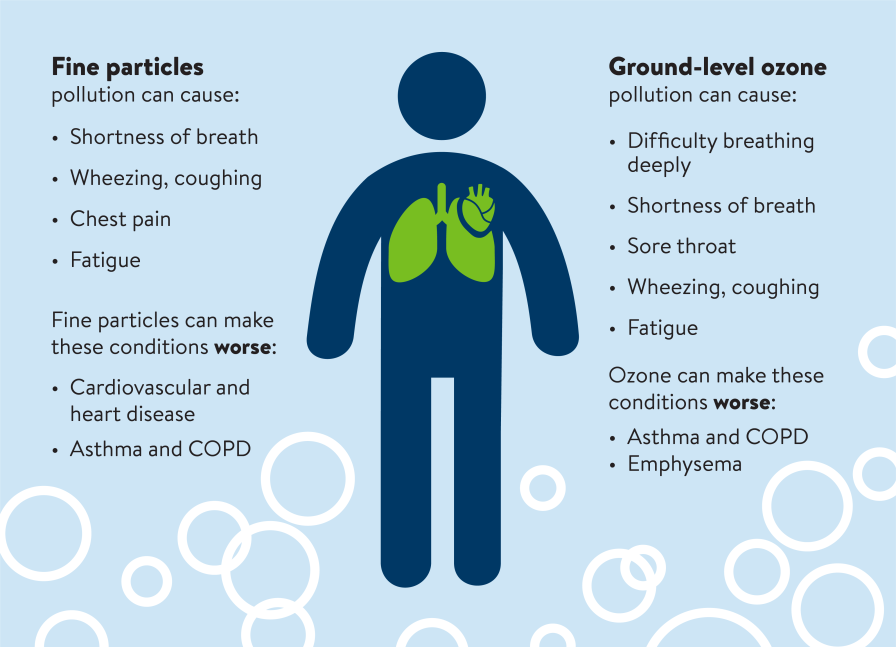
Ground-level ozone is a colorless gas found in the air we breathe. It can cause adverse health impacts including increased asthma attacks, reduced lung function, and respiratory irritation. As the air enters the lungs, ozone can irritate the lining of the lungs’ passageways making it more difficult to breathe deeply, especially when exercising outdoors. In general, as concentrations of ozone increase, the risk of adverse health effects also increase.[1] People with lung diseases, children, and the elderly can be particularly sensitive and should take extra precautions to minimize ozone exposure.
Fine particulate matter (PM2.5), is a mixture of microscopic solid and liquid droplets suspended in the air which are 2.5 micrometers in diameter or less. The size of these tiny particles pose a concern because they can get deep into your lungs and affect both your lungs and heart. People with heart or lung disease, older adults, and children are considered at greater risk from particles than other people, especially when they are physically active. Exercise and physical activity cause people to breathe faster and more deeply—and to take more particles into their lungs.[2]
For both pollutants, when the air quality is at unhealthy levels, your chances of being affected increase the longer you are outdoors and the more strenuous your activity is. Since exercise is great for your health, it’s important to stay active but know when it is appropriate to make changes to protect yourself.
How Can You Protect Yourself?
- Use AQI forecasts, available on AirNow.gov to help you plan your outdoor activities. On days when the AQI is forecast to be unhealthy, take simple steps to reduce your exposure, including:
-
- Choose a less intense outdoor activity,
- Shorten your outdoor activities,
- Reschedule/relocate activities,
- Exercise away from busy roads.
- Get daily forecasts sent directly to you via EnviroFlash.
- Download the AirNow mobile app.
- For more information, visit NJDEP| Air Planning | Air Quality Evaluation and Planning
[1] Ozone and Your Health, EPA Office of Air and Radiation, 2009
[2] Particle Pollution and Your Health, EPA Office of Air and Radiation, 2003
Tuesday, May 6: Air Quality and Clean Transportation
Each year New Jersey sees a reduction in air pollution due to cleaner vehicles, engines, and fuels, as well as smarter travel and personal choices that minimize emissions from the transportation sector. Two exciting actions in New Jersey are helping to keep this trend going: The WaitClean! Campaign and the eMobility Program.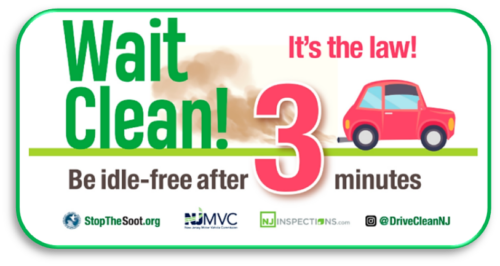
No-Idling: The WaitClean! Campaign is a statewide public education and awareness campaign to encourage the public to stop unnecessary vehicle idling. Idling produces excess vehicle pollutants, such as carbon dioxide (CO2) and particulate matter (PM), which can contribute to the degradation of ambient air quality. Turning the engine off when the vehicle is not in use will reduce tailpipe pollutants that are carcinogenic and can exacerbate chronic health impacts such as asthma and other respiratory diseases. By being idle-free, you can save fuel for driving and also save money.
New Jersey Idling Regulations: The WaitClean! Campaign also reminds the public that in New Jersey vehicles must be turned off after 3 minutes of idling. A person who idles longer than 3 minutes may be fined up to $250 for the first offense.
The WaitClean! Campaign serves as a good reminder that changes in your habits can have a positive benefit on your health, your wallet and the environment. For more information on idling NJDEP| Stop the Soot | Idling
Shared-use Zero Emission Transportation in Overburdened Communities
eMobility is a clean transportation project that provides electric vehicles for use in low- to moderate-income communities disproportionately impacted by air pollution. The program provides carshare and ride hailing programs, electric taxis, shuttle services, and more to benefit citizens, especially those who may not own their own vehicles.
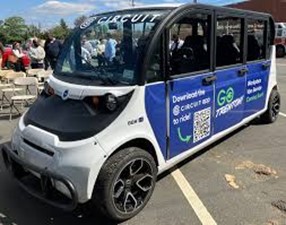
eMobility in Action! The GOTrenton! program was the first DEP funded eMobility project and one of the first fully electric, subsidized rideshare efforts in the country to serve low-income, overburdened communities. GOTrenton! is a collaborative, electric mobility solution that will improve resident access to jobs, healthcare, food shopping, social services, and new opportunities for everyone who lives, works, and plays in Trenton. Transportation emissions are the number one source of greenhouse gas emissions and GOTrenton! is a key step in mitigating climate change, creating positive health outcomes, and improving quality of life for Trenton residents.
For more information on GOTrenton! and other eMobility projects, visit NJDEP| Drive Green NJ | eMobility
Wednesday, May 7: Air Quality and Building Emissions
Buildings are the second largest source of air pollution in New Jersey and account for 25% of total net statewide emissions. Whether talking about your home, workplace, or favorite restaurant, most of the emissions from buildings come from the combustion of natural gas for space and water heating (you know, those things that keep us warm during cold winter months and provide hot water to our faucets).
Most of the emissions from space and water heating in buildings include nitrogen oxides (NOX) and carbon dioxide (CO2), both of which are greenhouse gases and major contributors to climate change. These emissions directly impact the surrounding air quality, and consequently, our health. Short term exposure to NOx can cause respiratory issues such as decreased lung function and exacerbated asthma. Long-term exposure to NOX can cause more extreme problems, such as cancer, asthma, premature mortality, and respiratory illness in children.
How is New Jersey reducing emissions in buildings? To significantly reduce emissions in buildings, there is a need to first identify how energy is being used in a building and implement energy efficiency strategies aimed at lowering the identified energy usage thereafter. In recent years, New Jersey has acted towards advancing these efforts:
- Since December 2023, New Jersey’s Energy and Water Benchmarking Program requires commercial and public buildings over 25,000 square feet to benchmark their energy and water usage, with continued tracking of their building’s performance over time.
How to get involved: New Jersey and its utilities offer financial incentives for energy audits and energy efficiency upgrades. Some of these key incentives offered in New Jersey include:
| Building Sector | Program |
|---|---|
| Commercial, Industrial, and/or Institutional | Large Energy Users |
| NJ COOL Pilot | |
| Pay for Performance - New Construction | |
| SmartStart - New Construction | |
| Government Entities | Energy Savings Improvement Program |
| Free Local Government Energy Audit | |
| Residential: Homeowners and/or Renters | Energy Efficient Products |
| Moderate-Income Weatherization | |
| New Construction | |
| New Jersey Comfort Partners | |
| Quick Home Energy Check-Up | |
| Residential: Multi-Family | Multi-Family Program |
To learn more about other energy efficiency programs you might qualify for, refer to the New Jersey Clean Energy Program’s ‘Find a Program’ webpage.
Thursday, May 8: Knowing Your Air Quality

Did you know that New Jersey has been monitoring air quality since the 1960’s? Thanks to state, regional and national air pollution reduction efforts, pollution levels have improved significantly since then. For criteria pollutants, monitoring data is used to determine whether the state is meeting the National Ambient Air Quality Standards for ground-level ozone, particulate matter, nitrogen dioxide, sulfur dioxide, carbon monoxide and lead. New Jersey’s efforts have paid off and air quality is measuring compliance with most of the NAAQS, with ground-level ozone being the most persistent problem. There are twenty-five (25) monitors around the state that report current air quality levels. Additional information, ambient air quality trends, annual monitoring reports and real-time data, can be found at: NJDEP | Air Monitoring.
Air Quality Index (AQI): The AQI is a simple color-coded scale to help the public easily understand the quality of the air outside on a daily basis. It uses color-coded categories that tell you about air quality at your location, the potential health impacts, and steps you can take to reduce your exposure to air pollution. The higher the AQI value, the greater the level of air pollution, and the greater the health concern.
Understanding the quality of the air outside is important, especially as the weather warms and people enjoy more time outside playing sports, exercising, or hanging out with friends and family. Ozone and fine particulate matter (PM2.5) are the two pollutants measured by the AQI. At unhealthy levels, these pollutants could affect anyone, but they are of special concern for vulnerable populations, such as people with pre-existing conditions, children, teens, and the elderly.
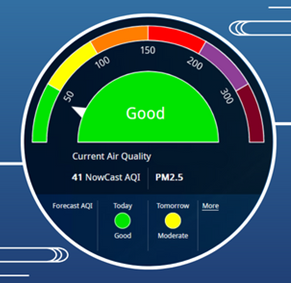
Air Quality Flag Program: The New Jersey Air Quality Flag Program is a tool available to schools, senior centers, camps, and day care centers. The program uses colored flags based on the AQI to notify people about outdoor air quality conditions. Each day, participants display a flag that corresponds to their local air quality forecast. Community members can then modify outdoor activities, if needed, to protect their health.
What Can You Do? Take these actions to improve air quality in New Jersey, and reduce your exposure to poor air quality:
- Sign up for EnviroFlash – EnviroFlash will email/text your daily local air quality forecast.
- Encourage your schools, summer camps, senior centers, daycare centers and other local organizations to sign up for the New Jersey Air Quality Flag Program. Eligible organizations will receive a set of flags and educational toolkit at no cost.
- Limit outdoor activities when air quality is considered poor and unhealthy, especially for sensitive individuals.
- Choose a cleaner way to commute such as carpooling, riding your bike, or using public transportation.
- Do not idle vehicles for more than 3 minutes. It is the law in NJ, with limited exceptions.
- Refuel your vehicle at night and stop refueling your vehicle when the nozzle clicks off.
- Delay mowing your lawn until air quality is healthy.
Friday, May 9: Air Quality and Outdoor Activity featuring Liberty State Park Revitalization
 Warmer weather is on the horizon and now is the perfect time to explore all that New Jersey has to offer at its stunning parks and beaches. The Liberty State Park Revitalization Program is a great example of New Jersey’s commitment to sustainability, reducing air pollution, and ensuring the park remains a healthy and enjoyable destination for generations to come.
Warmer weather is on the horizon and now is the perfect time to explore all that New Jersey has to offer at its stunning parks and beaches. The Liberty State Park Revitalization Program is a great example of New Jersey’s commitment to sustainability, reducing air pollution, and ensuring the park remains a healthy and enjoyable destination for generations to come.
Outdoor Activity: The Liberty State Park Revitalization Program will transform the parks perimeter with more than 100 acres of active recreation, arts, and cultural enhancements. A new central park will showcase world-class natural landscapes designed to protect against flooding and climate change while offering visitors passive recreation and educational opportunities. Designated lawn space at the park will also become a gathering space known as the Marina Green, complete with athletic fields and a picnic area designed to encourage outdoor activities.
Electric Vehicle Charging: Assisting in the pathway towards cleaner air, electric vehicle chargers are set to be installed in Liberty State Park’s Parking Lot #4. The parking lot will include both Level 2 and Level 3 DC Fast chargers, offering a total of 23 parking spaces dedicated to electric vehicle charging. Increasing the availability of EV chargers to park visitors is a sustainable initiative contributing to cleaner air and reduced park emissions. As part of New Jersey’s commitment to transitioning the state from fossil-fuel-powered vehicles to electric vehicles (EVs), providing convenient charging infrastructure at parks is a crucial step in supporting the growing number of electric vehicle owners and promoting sustainable tourism. Groundbreaking for the installation of the Parking Lot #4 electric vehicle chargers is expected in 2025.
Public Transportation: In 2024, the New Jersey Department of Environmental Protection launched a free pilot shuttle service aimed at enhancing passenger connectivity to light rail transit and increasing accessibility to various park amenities. This service featured stops at the Liberty Science Center and the Liberty State Park Light Rail Station. Encouraging the use of public transportation is an effective strategy for improving air quality. The second year of the pilot shuttle program is expected to launch in late spring 2025.
Learn more about the Liberty State Park Revitalization Program, Holistic Long-term Master Plan.

